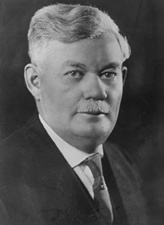John G. Townsend
John Gillis Townsend Jr. (born May 31, 1871 in Bishopville , Worcester County , Maryland , † April 10, 1964 in Philadelphia , Pennsylvania ) was an American politician and governor of the state of Delaware from 1917 to 1921 . Between 1929 and 1941 he represented his state in the US Senate .
Early years and business advancement
John Townsend attended local schools in his homeland. He worked as a telegraph for a railroad company and quickly realized that there was a great need for railroad ties. He founded a sawmill and manufactured and sold the sleepers to the railroad. In 1896 he moved to Selbyville , Delaware. There he was mainly active in fruit growing. Among other things, he grew strawberries and was named "Strawberry King". Townsend soon became one of the largest fruit growers in the United States. Townsend also got into poultry farming and other agricultural areas. So successful was his business that he founded his own bank, the Baltimore Trust Company , of which he became president. Townsend has also directed several other firms, including the Peninsula Real Estate Company . Throughout his life, including during his political activities, he devoted himself to this business.
Political rise
Townsend was a member of the Republican Party . Between 1901 and 1903 he was a member of the House of Representatives from Delaware . He was a delegate to the Republican National Convention of 1904, at which Theodore Roosevelt was again nominated as a candidate for president. In 1916 Townsend was elected governor of his state as his party's candidate with 52% of the vote against the later US Senator James H. Hughes , the candidate of the Democratic Party .
Delaware Governor
John Townsend took up his new office on January 16, 1917. During his tenure, the United States entered World War I in April 1917 . For Delaware, too, this meant that production had to be converted to armaments. In addition, soldiers had to be drafted and made available to the armed forces. After the end of the war in November 1918, industrial production then had to be reduced to meet civilian needs. In addition to these war-related activities, Townsend campaigned for an improvement in transport and women's suffrage . He was also in favor of improving the school system and better regulation of compensation in the event of incapacity for work ( workmen's compensation ). In Townsend's tenure, the nationwide prohibition law came into force with the 18th amendment to the constitution.
Townsend in the US Senate
In 1928, John Townsend was elected Class 1 Senator against Democratic incumbent Thomas F. Bayard . After re-election in 1934, he was able to represent his state as a senator in Congress between March 4, 1929 and January 3, 1941 . In the Senate, he was Chairman of the Committee to Audit and Control the Contingent Expenses . He was also a member of the commission that dealt with the construction of Mount Rushmore National Monument . Townsend was also a member of the Republican Election Committee for the US Senate from 1936 to 1941. In 1940 he was defeated in the congressional elections to the Democrat James M. Tunnell , who was his successor in the Senate from January 1941.
Another résumé
After his tenure in Congress was over, Townsend returned to his extensive business. He was also the curator of several schools and universities. John Townsend died in April 1964 at the age of almost 93. He had seven children with his wife, Jennie Collins.
literature
- Robert Sobel and John Raimo (Eds.): Biographical Directory of the Governors of the United States, 1789–1978. Volume 1, Meckler Books, Westport, 1978. 4 volumes.
Web links
- John Townsend in the National Governors Association (English)
- The governors of Delaware (English)
- John G. Townsend in the Biographical Directory of the United States Congress (English)
- John G. Townsend in the database of Find a Grave (English)
| personal data | |
|---|---|
| SURNAME | Townsend, John G. |
| ALTERNATIVE NAMES | Townsend, John Gillis |
| BRIEF DESCRIPTION | American politician |
| DATE OF BIRTH | May 31, 1871 |
| PLACE OF BIRTH | Bishopville , Maryland |
| DATE OF DEATH | April 10, 1964 |
| Place of death | Philadelphia , Pennsylvania |


